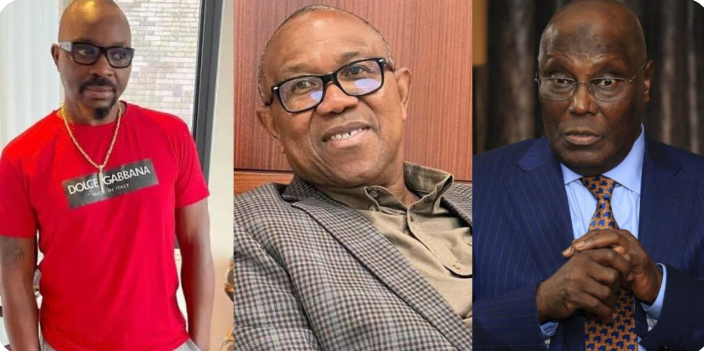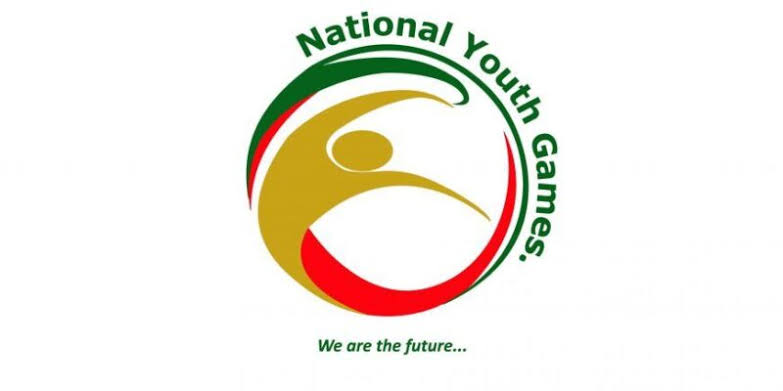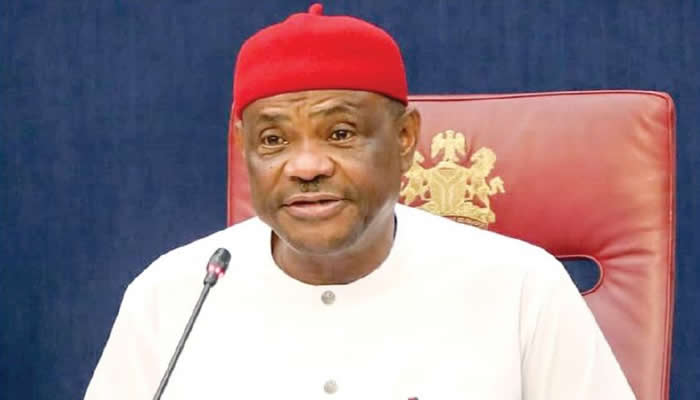
“Now That Atiku Has Left, It’s Time for Peter Obi to Return” – Isaac Fayose Sparks Political Frenzy

In a twist that has sent ripples across Nigeria’s political landscape, social commentator Isaac Fayose has publicly called on Peter Obi to return to the Peoples Democratic Party (PDP) following the sudden resignation of former Vice President Atiku Abubakar. The news, which broke early Wednesday, has ignited speculation, reactions, and renewed political calculations across the country. For Fayose, however, this is more than just breaking news—it is, in his own words, a “long-awaited blessing.”
Fayose didn’t mince words in his celebratory video, making it clear that Atiku’s exit is nothing short of a liberation for the PDP. “Good news! Atiku has finally resigned from PDP. Good news! I have been trying to suspend him for years, e nor go. Finally baba don go,” he declared with unfiltered excitement. His reaction was not just about Atiku’s departure—it was a direct and intentional invitation to Peter Obi, whom he believes now has an open path to return to his former political family and claim the presidential ticket.
Atiku’s political journey with the PDP has been tumultuous, to say the least. Having left and rejoined the party multiple times over two decades, the former vice president’s inconsistency has long been a source of controversy. Fayose referred to this as a “third time in 20 years,” casting it as a symptom of what he calls “desperation.” His critique was scathing. “Atiku’s ambition has grounded the party for too long,” he added, suggesting that the former vice president’s constant political maneuvering had stalled the growth and effectiveness of the PDP.
With Atiku now out of the picture, Fayose believes the PDP can finally focus on rebuilding itself as the formidable opposition it was once known to be. His comments seemed to reflect not just relief but a strategic urgency. He sees Peter Obi, the Labour Party’s 2023 presidential candidate and former PDP stalwart, as the ideal figure to spearhead the party’s resurgence. “I hope Obi can come back to PDP now because they have got a lot of spread,” Fayose said. “I hope Obi can come back now!”
The call for Peter Obi’s return is not coming in a vacuum. It arrives at a time when many Nigerians are reevaluating their political alignments and expectations. Obi, who left the PDP in the run-up to the 2023 elections due to internal conflicts and what he described as “structural issues,” quickly became the face of a third-force movement. His candidacy under the Labour Party galvanized young voters and urban intellectuals, shaking the traditional political structure in a way that surprised even the most seasoned analysts. Despite ultimately losing the election, Obi’s campaign proved that there is a powerful hunger for change—and that he remains a viable presidential contender.
But now, the political chessboard is shifting again. Atiku’s exit removes a powerful northern contender from the PDP’s internal power struggle, possibly easing the path for a Southern candidate. Fayose emphasized this point clearly, saying, “The Southerners will not have someone dragging their slot with them. It is a good news the party will have peace now.”
Indeed, the PDP has long struggled with internal zoning debates, regional interests, and leadership crises. With Atiku often seen as the biggest obstacle to Southern aspirations within the party, his resignation could be the turning point many have been waiting for. Fayose’s enthusiasm reflects a broader sentiment among certain PDP loyalists who believe the party has been held hostage by Atiku’s perennial ambition for too long.
Still, not everyone is celebrating. The news of Atiku’s resignation has stirred confusion within PDP ranks, with party leaders scrambling to assess the implications and chart a path forward. Some fear the party may fragment further without Atiku’s clout and connections, especially in the North. Others argue that his departure could create a vacuum that inspires new leadership to emerge, free from the burdens of recycled candidates.
Peter Obi himself has not issued any public statement in response to Fayose’s appeal, but political observers are already watching closely. The question on everyone’s lips: Will Obi heed the call and return to the PDP? If he does, it could dramatically reshape the 2027 electoral field. If he chooses to remain in the Labour Party, the PDP will be forced to search for another unifying figure—an uphill task, given the divisions that have plagued it for years.
Meanwhile, the video of Fayose’s impassioned reaction continues to circulate online, igniting heated debates on X, Facebook, and WhatsApp groups. Some Nigerians applauded his candor, agreeing that Atiku’s departure was long overdue. Others criticized the timing and tone of the comments, warning that it could deepen divisions within the opposition rather than heal them.
But Fayose remained unfazed. His message was clear: the PDP now has a chance to reinvent itself, and it must not waste the opportunity. “So you can allow the party to become the proper opposition that it is supposed to be,” he said, directing his words at Atiku. The subtext was unmistakable—this is a new dawn for the PDP, and only a new kind of leadership can move it forward.
Whether Peter Obi chooses to return or not, one thing is certain: Nigerian politics has entered a new and unpredictable phase. The resignation of Atiku Abubakar, a figure once seen as inevitable in every election cycle, marks the end of an era. And as Isaac Fayose passionately reminds everyone, it might just be the beginning of another.


